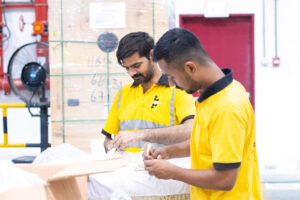
Exploring new source markets
Securing food supply
TFI – Your Dedicated Freight Forwarding Partner for the Red Sea Crisis
Prominent supermarkets in the UAE are maintaining stable prices for essential goods despite ongoing challenges in the supply chain due to persisting shipping costs brought by the Red Sea crisis. Houthi rebels have been targeting cargo ships and tankers navigating the Red Sea, the busiest trade route globally, since late last year, as a response to Israel’s conflict with Gaza. This has led to significant disruptions in the supply chain.
Nevertheless, supermarkets in the UAE have guaranteed price stability for essential items throughout the holy month of Ramadan. However, some have acknowledged that sustaining these prices may only be feasible in the short term.
Shabu Abdul Majeed, director of retail operations at Lulu Group, has emphasized their commitment to maintaining stable prices during Ramadan. They have instructed all suppliers not to increase prices and have introduced high-quality private label products offering value for money. Additionally, they plan to keep essential product prices fixed and offer significant discounts of 60-70% on food and other grocery items throughout Ramadan.
Choithram, a supermarket chain, is also providing discounts during Ramadan. Rajiv Warrier, CEO of T. Choithrams and Sons, mentioned that they have launched various promotions across their UAE stores for Ramadan and their 50th anniversary. He anticipates price stability in the short term, with potential support from decreased interest rates to offset cost increases from freight and other factors.
Numerous ships are currently opting for the Cape of Good Hope route, which is both more time-consuming and costly.
Local supermarket chain Spinneys has refrained from implementing any price increases amid the current regional circumstances, as stated by CEO Sunil Kumar.
He notes a modest increase in shipping costs, significantly lower than those experienced during the Covid-19 pandemic. Kumar also reveals that they address cost hikes in the supply chain by employing alternative freight methods when feasible.
Exploring new source markets
Amid ongoing attacks in the Red Sea and regional political tensions, some are opting to explore new source markets as a strategy to overcome these challenges.
Shabu explained that due to the current challenging circumstances, they have increased sourcing from South Africa, China, and the Philippines to avoid the troubled Red Sea route. Additionally, they emphasize close collaboration with suppliers, vendors, distributors, and sourcing offices globally to maintain stable prices.
Rajiv emphasized that supply chain vulnerabilities, especially in sea freight, have been highlighted by recent issues, but Choithrams is adept at managing them. He noted their diversified supplier network as a strength, enabling them to tackle unforeseen challenges and ensure distribution continuity. Additionally, the company proactively seeks alternatives, swiftly addressing disruptions by sourcing alternative suppliers, rerouting shipments, or adjusting inventory management strategies.
He emphasized the company’s proactive approach in seeking alternatives, taking swift and decisive action to address disruptions. This includes sourcing alternative suppliers, rerouting shipments, and adjusting inventory management strategies as necessary.
Securing food supply
Sunil highlighted Spinneys’ efforts in ensuring food security by partnering with local farmers. This strategy aims to decrease transportation costs, minimize food miles, bolster the local economy, and promote food security. Spinneys is dedicated to maintaining a balance between international sourcing for preferred products and supporting local producers.
Choithrams is proactively preparing for heightened demand to maintain timely deliveries. Rajiv mentioned they are placing orders in advance and providing quarterly forecasts to suppliers to accommodate the anticipated increase in delivery requirements.
Meanwhile, Lulu ensures a six-month supply is consistently stocked. Shabu emphasized their role as a crucial contributor to the country’s food security, underscoring the importance of maintaining sufficient food reserves in their warehouses.
Lulu maintains a six-month supply in stock at all times, emphasizing its role in ensuring the country’s food security. Shabu highlighted the importance of consistently having ample food reserves in their warehouses.
TFI – Your Dedicated Freight Forwarding Partner for the Red Sea Crisis
Taking pride in our over three decades of operational experience in global freight forwarding, we offer reliable and customized solutions that strategically tackle disruptions in international trade routes. Our team accommodates your unique timeline and budget requirements by employing air, land, sea, and multimodal transportation to efficiently move your cargo to its final destination.
Backed by our ISO-certified processes, extensive global network, 24/7 customer support, reduced transit time, and end-to-end logistics solutions, we are your qualified partner in the Red Sea crisis and for all seasons.
For more details, get in touch with us today!
Source: https://www.khaleejtimes.com



